Header image via Pixabay
Want to write faster? Get in line. This is a question that’s been plaguing writers since the dawn of time. So as you can imagine, there are a ton of books on the market claiming they have the answer. And while the cynic in me finds it impossible to believe that any of them have more to say than “practice, practice, practice” — after all, isn’t that the fastest way to Carnegie Hall? — I purchased six of the most popular titles to see what secrets they hold.
![]() "2K to 10K: Writing Faster, Writing Better, and Writing More of What You Love" by Rachel Aaron
"2K to 10K: Writing Faster, Writing Better, and Writing More of What You Love" by Rachel Aaron
Aaron’s primary efficiency tip is to find the time of day when your capacity for productivity is highest and align your writing with that window. Initially, this may involve placing several sessions throughout the day to find that sweet spot. But once you’ve found the perfect time, the next step is to find the perfect location for creative thinking. Be advised that this might not be your home office since there are a number of visual cues that can become a distraction (food, kids, television, et cetera). You might find that you write better at work afterhours or at the local library on your lunch break. Regardless, the goal is to create a routine time and place so that writing becomes a natural part of your day, not a chore.
As you build your writing habit, Aaron suggests tracking where, when, and how much you write, to help determine your productivity patterns. She also advises taking time to visualize what you want your scene to accomplish prior to writing to help eliminate any unproductive sessions.
Her final piece of advice is to prioritize the scenes that are most interesting to you. She believes your passion will motivate you to complete those passages quickly and efficiently. But more importantly, by ensuring your writing is fun, you increase the number of days you’re likely to write, which gets your project finished faster. Or to quote Aaron, “If your goal is to become a faster writer, the single most efficient change you can make isn’t actually upping your daily word count, but eliminating the days where you are not writing.” And even though it's been over ten years since she first covered this topic on her blog, this text is still considered one of the top writer productivity guides.
Get 2K to 10K at Bookshop or Amazon
![]() "Write Every Day: How to Write Faster, and Write More" by Cathy Yardley
"Write Every Day: How to Write Faster, and Write More" by Cathy Yardley
Write Every Day is the fourth entry in Yardley’s Rock Your Writing Series. In the introduction, she states her goal is to help writers identify and overcome the obstacles to consistent writing, so her advice deals more with mindset than productivity. To that end, she first recommends taking a week to track your nonwriting activities to determine your type:
• Someone who genuinely lacks free time and therefore does not have the capacity to write regularly
• Someone who uses their time inefficiently and thus only appears to lack writing time
• Someone who harbors a writing fear (e.g. imposter syndrome)
• Someone who lacks a clear process (e.g. unsure about the purpose of the manuscript)
Once you’ve determined what’s holding you back, she recommends exploring why you want to write faster and why you’re working on the project at hand. Is the need for speed due to a pending deadline or a mere desire to keep up with the Joneses? Is the manuscript a neglected passion piece or a dreaded sequel requested by the publisher? She stresses that pinpointing your purpose will help define your motivation to move forward.
Next, be specific about your writing expectations. Rather than saying, “I want to write every day,” or “I want to write faster,” which is akin to wishing in the wind, Yardley recommends writing down a clear plan to ensure action: “I want to write two books a year, and I will ensure that happens by committing to writing 1000 words every day (except Saturdays) at 5AM on my iPad at the kitchen table.” Do the math and measure your time to ensure this is a realistic feat for your current lifestyle. Do you have four kids, a spouse, and a dog who are all going to demand essential parts of your time? Be honest about your skills, ability, and how long things actually take to maximize your chances for success. Be gentle with yourself and make decisions that build confidence, not frustration.
She also strongly suggests tracking your progress (word count tracker, daily diary) as a way to celebrate your wins, reinforce your efforts, and spur momentum through a visual representation of your progress. Similarly, solidify your commitment by enlisting a fellow writer as an accountability partner. This will keep you honest about the promise you've made to yourself and give you a supportive sounding board. Lastly, Yardley notes it is important to reward yourself for even the smallest success and build time into your schedule for rest and replenishment.
Get Write Every Day at Bookshop or Amazon
![]() "30-Day Author: Develop a Daily Writing Habit and Write Your Book in 30 Days (or Less)" by Kevin Tumlinson
"30-Day Author: Develop a Daily Writing Habit and Write Your Book in 30 Days (or Less)" by Kevin Tumlinson
Kevin Tumlinson, the Director of Marketing and PR for Draft2Digital, essentially has one big tip for writing faster: create a daily habit. Beyond that, he recommends talking through your scenes and then recording them on a laptop or smartphone. If that doesn’t appeal to you, brainstorm your scenes with a friend. Explain the current state of your story, and work with them to uncover the next steps in the plot. Record and transcribe your findings. This is a great way to turn blank pages into full ones, especially if you’re stuck on a scene.
Get 30-Day Author at Amazon
![]() "No Plot? No Problem! A Low-Stress, High Velocity Guide to Writing a Novel in 30 Days" by Chris Baty
"No Plot? No Problem! A Low-Stress, High Velocity Guide to Writing a Novel in 30 Days" by Chris Baty
Founder of National Novel Writing Month, Chris Baty, created this book to help writers prepare their minds (and households!) for the sacrifice involved in sitting down to write every day for the month of November. So at its core, this guide is best for authors looking to write quickly under that scenario. And yet, the book’s theme of planning ahead and anticipating problems is evergreen.
First, turn off your inner editor and embrace the mess of a crappy first draft. Release yourself from the burden of tinkering with scenes in the quest for perfection. Remember, our artistic and analytical sides don’t play well together, so concentrating solely on creativity allows your brain to remain connected with the colorful ideas brewing in your subconscious. To remain entrenched in your art brain, you may also need to bypass tough scenes. Simply leave yourself some notes as a reminder of what needs to be filled in later. Trust that the momentum of finishing something quickly will propel you forward and the revision needed on such a rough manuscript will come easier once you have the full story framework in front of you.
Second, set a public deadline. For traditionally published authors, this might be with your editor. Indie authors may announce a preorder date, and newbies may share their goals on social media. Yet, the resultant pressure should be the same for everyone. With too much time on our hands, we tend to dawdle. But with a crushing deadline on the horizon, we make decisions, create a timeline, and execute.
Lastly, engage in writing sprints. These are short intervals of concentrated effort, anywhere from three to thirty minutes, where participants are expected to write nonstop. These sessions are often done in groups to create a sense of friendly competition and inspire you to push for higher numbers during subsequent sprints. Plus, being part of an artistic community has the added benefit of reinforcing your author mindset.
Get No Plot? No Problem! at Bookshop or Amazon
![]() "Book in a Month: A Fool-Proof System for Writing a Novel in 30 Days" by Victoria Lynn Schmidt
"Book in a Month: A Fool-Proof System for Writing a Novel in 30 Days" by Victoria Lynn Schmidt
Schmidt’s main advice for completing your thirty-day novel are to work “as if” any changes you make or problems you encounter are already solved. This is meant to keep you writing and prevent you from stopping to tweak things whenever new decisions are made about content. If you come up with something brilliant mid-project, write the information in a notebook organized by act so you can implement the ideas later. Schmidt insists, “You cannot write and rewrite at the same time if you want to finish a book in thirty days.” She also recommends that this first draft should leave out subplots since the secondary storyline can’t really be developed until the main one is solidified.
Get Book in a Month at Amazon
![]() "Write Better, Faster: How to Triple Your Writing Speed and Write More Every Day" by Monica Leonelle
"Write Better, Faster: How to Triple Your Writing Speed and Write More Every Day" by Monica Leonelle
This is the third book in Leonelle’s Productive Novelist series, and she recommends writers start with a daily eight-minute writing habit to build a consistent routine. This is a manageable commitment that can be embedded into even the busiest schedule, and because of its simplicity, this habit has the potential to lead to larger goals. To guarantee the implementation of this quick habit, she recommends keeping a notebook or laptop by your beside to complete those words the second you wake each day. This means you will need to have an outline nailed down in advance, but the eight-minute habit is a powerful way to build and keep momentum.
Similarly, Leonelle recommends letting go of the need to find the perfect place to write. She sees that as just another excuse for putting off the task. Instead, take advantage of any downtime and sneak in bits of writing while you’re on the move. Jot ideas down during your morning commute, craft a scene while standing in line at the cleaners, or scribble a few words on a notecard at lunch. This habit will become invaluable if you’re someone with kids or a demanding day job. When writing on the go, she admits that dictation is her preferred method for capturing text and recommends the Dragon Dictation app. She goes on to list several benefits for dictation, the most striking being that it removes the internet distractions that often occur when typing and forces you to turn off your inner editor because there’s no real way to tinker with the text other than to keep talking.
Her final tip is to always have a Plan C. That is to say, think about things that have sabotaged you in the past. Anticipate those problems and have a strategy in place to deal with them. For example, if an emergency or fatigue causes you to miss the hour of writing you had scheduled, maybe your Plan C is to spend five minutes rereading your last scene and taking notes on where you’ll start writing tomorrow. This will keep you moving forward on your manuscript and give you an easy win for the day.
Get Write Better, Faster at Amazon
What I Learned
Temper your expectations when buying these types of books. There is no magic formula. Faster writing begins with you creating a better mindset. Do you really want a published book? A writing career? A bestseller? Make time to write regularly whether it’s every day or twice a week. To quote Stephen King, “Amateurs sit and wait for inspiration, the rest of us just get up and go to work.”
• Find your perfect writing time and location (and stick to them).
• Develop a focus for each writing session.
• Turn off your inner editor and embrace the mess.
• Sprint! Write in short but frequent chunks, rather than long blocks.
• Establish accountability by enlisting a writing buddy and tracking your progress.
• Plan ahead and anticipate problems.
• Try dictation.
I think when we get desperate to make progress or feel behind, we start to look for quick fixes. We totally forget that good writing takes training, effort, and time. Does that mean slaving all day (every day) over coffee? Not necessarily. But the productivity one expects to gain by writing faster typically originates from the core elements of proficiency, efficiency, and consistency.
It’s just as simple as that.

About the author
Andrea is a writer and editor who specializes in mystery and romance. She holds a creative writing M.F.A. from Seton Hill University and a copyediting certification from UC San Diego. Her craft essays can be found on several websites such as Funds for Writers, DIY MFA, and Submittable. She also writes book reviews and entertainment news for the women's lifestyle website Popsugar and is the author of the Victoria Justice Mysteries by Polis Books. These killer courthouse cozies follow a young stenographer who realizes her transcripts hold the key to solving a string of murders (think Law & Order meets Murder, She Wrote). To learn more about Andrea’s work, visit ajthenovelist.com or follow @ajthenovelist on Twitter.
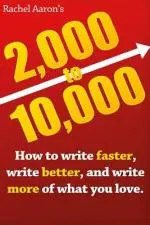 "2K to 10K: Writing Faster, Writing Better, and Writing More of What You Love" by Rachel Aaron
"2K to 10K: Writing Faster, Writing Better, and Writing More of What You Love" by Rachel Aaron
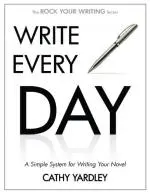 "Write Every Day: How to Write Faster, and Write More" by Cathy Yardley
"Write Every Day: How to Write Faster, and Write More" by Cathy Yardley
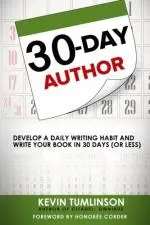 "30-Day Author: Develop a Daily Writing Habit and Write Your Book in 30 Days (or Less)" by Kevin Tumlinson
"30-Day Author: Develop a Daily Writing Habit and Write Your Book in 30 Days (or Less)" by Kevin Tumlinson
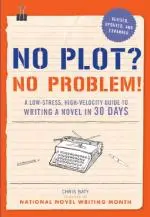 "No Plot? No Problem! A Low-Stress, High Velocity Guide to Writing a Novel in 30 Days" by Chris Baty
"No Plot? No Problem! A Low-Stress, High Velocity Guide to Writing a Novel in 30 Days" by Chris Baty
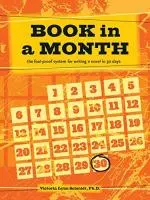 "Book in a Month: A Fool-Proof System for Writing a Novel in 30 Days" by Victoria Lynn Schmidt
"Book in a Month: A Fool-Proof System for Writing a Novel in 30 Days" by Victoria Lynn Schmidt
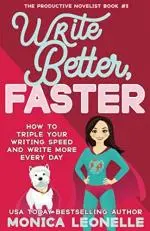 "Write Better, Faster: How to Triple Your Writing Speed and Write More Every Day" by Monica Leonelle
"Write Better, Faster: How to Triple Your Writing Speed and Write More Every Day" by Monica Leonelle








